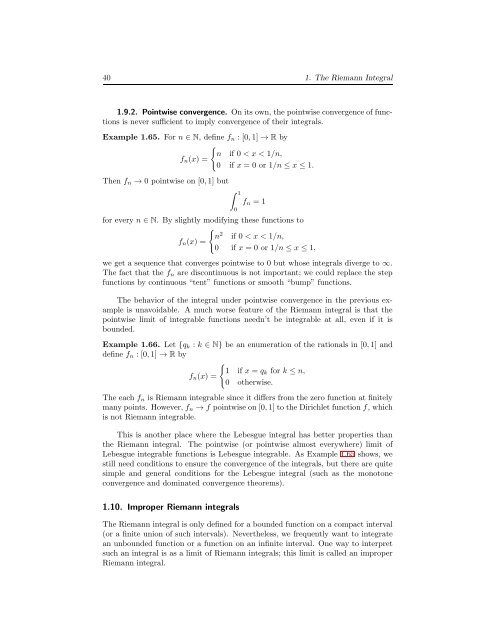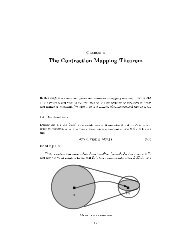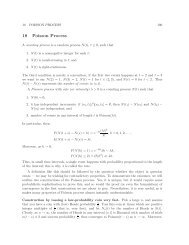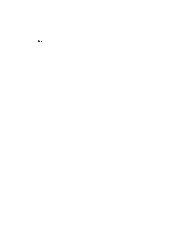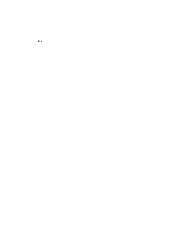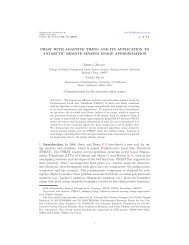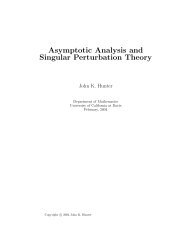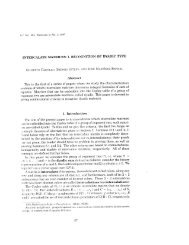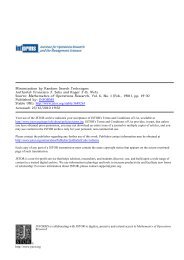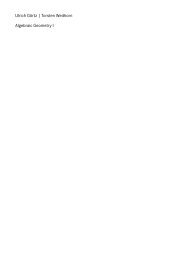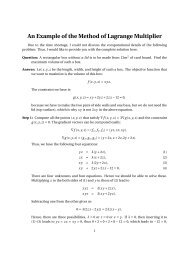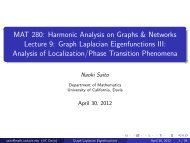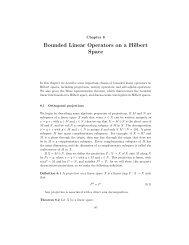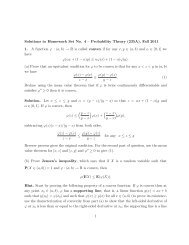The Riemann Integral
The Riemann Integral
The Riemann Integral
Create successful ePaper yourself
Turn your PDF publications into a flip-book with our unique Google optimized e-Paper software.
40 1. <strong>The</strong> <strong>Riemann</strong> <strong>Integral</strong><br />
1.9.2. Pointwise convergence. On its own, the pointwise convergence of functions<br />
is never sufficient to imply convergence of their integrals.<br />
Example 1.65. For n ∈ N, define f n : [0,1] → R by<br />
{<br />
n if 0 < x < 1/n,<br />
f n (x) =<br />
0 if x = 0 or 1/n ≤ x ≤ 1.<br />
<strong>The</strong>n f n → 0 pointwise on [0,1] but<br />
∫ 1<br />
0<br />
f n = 1<br />
for every n ∈ N. By slightly modifying these functions to<br />
{<br />
n 2 if 0 < x < 1/n,<br />
f n (x) =<br />
0 if x = 0 or 1/n ≤ x ≤ 1,<br />
we get a sequence that converges pointwise to 0 but whose integrals diverge to ∞.<br />
<strong>The</strong> fact that the f n are discontinuous is not important; we could replace the step<br />
functions by continuous “tent” functions or smooth “bump” functions.<br />
<strong>The</strong> behavior of the integral under pointwise convergence in the previous example<br />
is unavoidable. A much worse feature of the <strong>Riemann</strong> integral is that the<br />
pointwise limit of integrable functions needn’t be integrable at all, even if it is<br />
bounded.<br />
Example 1.66. Let {q k : k ∈ N} be an enumeration of the rationals in [0,1] and<br />
define f n : [0,1] → R by<br />
{<br />
1 if x = q k for k ≤ n,<br />
f n (x) =<br />
0 otherwise.<br />
<strong>The</strong> each f n is <strong>Riemann</strong> integrable since it differs from the zero function at finitely<br />
manypoints. However, f n → f pointwise on [0,1] to the Dirichlet function f, which<br />
is not <strong>Riemann</strong> integrable.<br />
This is another place where the Lebesgue integral has better properties than<br />
the <strong>Riemann</strong> integral. <strong>The</strong> pointwise (or pointwise almost everywhere) limit of<br />
Lebesgue integrable functions is Lebesgue integrable. As Example 1.65 shows, we<br />
still need conditions to ensure the convergence of the integrals, but there are quite<br />
simple and general conditions for the Lebesgue integral (such as the monotone<br />
convergence and dominated convergence theorems).<br />
1.10. Improper <strong>Riemann</strong> integrals<br />
<strong>The</strong> <strong>Riemann</strong> integral is only defined for a bounded function on a compact interval<br />
(or a finite union of such intervals). Nevertheless, we frequently want to integrate<br />
an unbounded function or a function on an infinite interval. One way to interpret<br />
such an integral is as a limit of <strong>Riemann</strong> integrals; this limit is called an improper<br />
<strong>Riemann</strong> integral.


